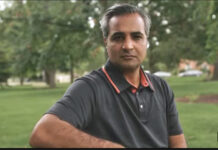By Mark Ellis —
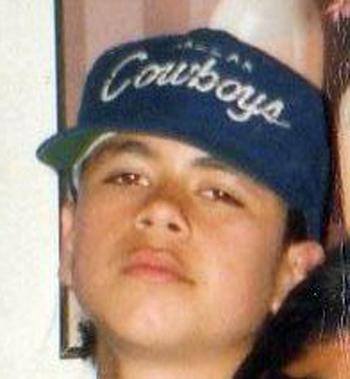
As a child, he was the subject of a bitter custody battle and felt lost amidst an array of counselors and psychologists determining where he would live. His parents never married, and he was shipped back and forth between the two.
“I was raised in the gang culture of Los Angeles,” says Brian Warth, author of Young Man Arise: Fresh Hope Emerging From The Darkness. “My older brothers and sisters were in gangs.”
Sadly, gang life ripped his family apart. In a horrible tragedy, his oldest brother was shot in the head and died. His second-oldest brother was shot multiple times.
In the midst of the rootlessness and pain, Brian slowly developed a connection to the gang members through his brothers and sisters. They fed him and cared for him. “I looked up to them and followed them,” Brian recounts. “I once thought I would never be a gang member, but that’s exactly what began to happen.”
 “At 12 I made one of the worst decisions of my life,” he confesses. He officially joined the gang and was initiated in a process known as “getting jumped in.” In his gang it meant he was beaten three times by other gang members.
“At 12 I made one of the worst decisions of my life,” he confesses. He officially joined the gang and was initiated in a process known as “getting jumped in.” In his gang it meant he was beaten three times by other gang members.
Brian’s father was a Christian and tried to steer him in the right direction – even enrolling him in Christian school. “I developed a bad attitude,” Brian recalls. “I had a chip on my shoulder. I wouldn’t listen to wisdom. Eventually, I kicked God out of my life. Now I was paying the price.”
At 14 rival gang members shot him at close range. Of the five shots, one lodged in his arm, which caused paralysis for a year. This further hardened his attitudes about life.
“I rebelled so hard I wore down my dad’s resistance. He couldn’t tell me what to do anymore. I dove deeper into the gang culture,” he says.
In the early 90s in Los Angeles the gang warfare rose to a new level, fueled by gangster rap. “You are drinking beer and listening to that music and it pumps you up to do bad things,” he says.
Fatal encounter
When Brian was 17, he and another gang member were driving around and noticed some gang graffiti sprayed on a wall by rival gang members. They drove away to get some spray paint so they could cross out the graffiti and assert their supremacy.
When they drove back, they noticed that several rival gang members were hanging out near the graffiti. “It was too dangerous to get out of the car,” Brian recalls.
As they began to drive away his friend asked, “Should we shoot at them?”
Brian said “yes” and watched his friend fire one shot out the window. It hit a rival gang member and he died.
The next morning police raided Brian’s house and arrested him. He was booked into juvenile hall, but the law stated if you were 16 or older you could be tried as an adult.
“I was responsible for the crime,” he admits. “I took a plea bargain for second degree murder.” At 17-years-old he was sentenced to life in prison.
His father told him there was only one hope left. “You have to give your life to the Lord,” he told his son as he went off to L.A. County Jail.
Brian found himself in a one-man cell, so small he could reach out and touch both walls with his hands.
“I sat on my bunk and rubbed my wrists as the officer slammed the cell door. It felt like a weight of despair was
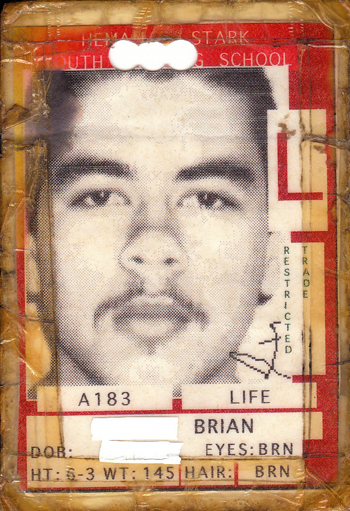
crushing me. My body bent over as my face pressed against my knees. For the first time, I really realized the depth, hurt and pain my crime had caused,” he says.
A powerful prayer
After he settled in, he heard a noise coming from the hallway. He stood up and pressed his face against the metal bars to see who was there. An elderly man ambled down the concrete walkway, passing out something.
Brian stepped back because he didn’t want to see anyone. But the man approached his cell with Christian literature in his hand. He tried to engage Brian with a word of encouragement.
“Mister, I just got sentenced to life in prison,” Brian said, trying to shock him. “What can you do for me?”
The man didn’t flinch. He reached thru the bars, grabbed Brian’s hands and launched into a powerful, Holy Spirit-led prayer for him “in the name of Jesus Christ.”
The impact of the prayer startled Brian himself. “I don’t know what happened to me,” Brian recounts. “For the first time, tears began to rain down my young face like a hurricane. In my darkest moment, this stranger penetrated my heart with the love of God.”
A couple days later God gave him an insight from above. “I realized that sooner or later I was going to wish I had started serving the Lord earlier, surrendered younger.”
The Spirit of the Living God convicted his heart and implanted a mustard seed of saving faith. “I decided not to wait. I got down on my knees and cried out to the God my dad had told me about. I cried for help and mercy,” and he was born again.
Brian didn’t feel very different in this dark ugly environment, amidst some of the worst juvenile offenders in L.A., but God gave him a powerful desire to read the Bible for the first time in his life.
“I just took one step at a time,” he says. “God began to send me people to disciple me. After he was transferred to the California Youth Authority, Chaplain Leonard Wilson Banks began to mentor him. “He saw things in me nobody else could see,” Brian says.
Then one day God impressed a powerful word on his heart. Brian if you serve me, if you don’t give up, I will set you free from this life sentence to impact the world with the gospel.
Brian began to treasure that word in his heart and it provided hope in the midst of despair.
A revival started in the prison in the mid 90s. Chaplain Banks gave Brian the opportunity to preach. “This was the beginning of my ministry,” Brian says.
He began to walk in the prophetic vision God placed on his heart, “so I never saw my self in prison. I saw myself preparing for what God had for me.”
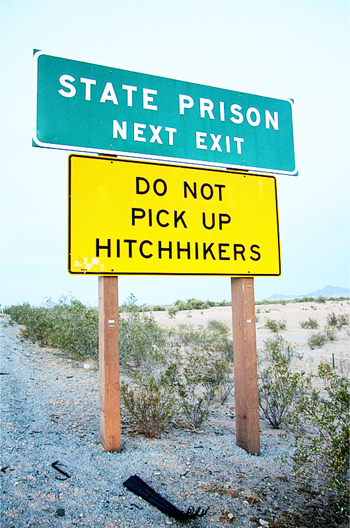 Brian was transferred to three different state prisons: Chino, Ironwood, and Chuckawalla Valley State Prison in Blythe. Blythe is located in the Sonoran desert near the California-Arizona border and 178 days a year it’s over 90 degrees. His prison dorm crammed 300 men into a space designed for 100 and had no air conditioning.
Brian was transferred to three different state prisons: Chino, Ironwood, and Chuckawalla Valley State Prison in Blythe. Blythe is located in the Sonoran desert near the California-Arizona border and 178 days a year it’s over 90 degrees. His prison dorm crammed 300 men into a space designed for 100 and had no air conditioning.
At 21, Brian married his childhood sweetheart, Laura, in the prison, but conjugal visits were not allowed for lifers. “She visited me every weekend. She gave her life to the Lord a little after I did,” he says.
As Brian grew in the Lord, he became a chaplain for one of the chapels in the prison.
“I began to recognize that God gave me a gift to speak to people and they would respond. He gave me a heart for broken people. We held rallies and hundreds of prisoners came. I honed my ministry gifts,” he says. Chaplain Dean Parker was another man who mentored him.
Hoping for parole
“When you get sentenced to life, you go through a parole board if they deem you rehabilitated. The parole decision goes to the governor.” California Governor Pete Wilson wouldn’t allow any paroles of lifers.
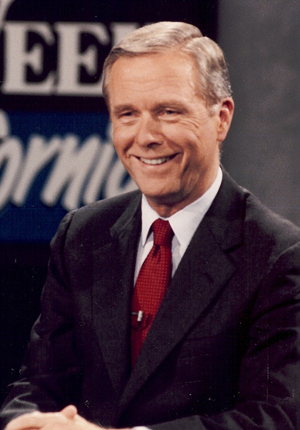
The next governor, Gray Davis, said no lifer would get out “except in a pine box.”
The governor appoints the parole board commissioners. “The environment was terrible for parole. It was an environment of hopelessness,” Brian notes.
Nevertheless, he trusted in the promise from God and believed he would be set free.
His first parole hearing was in 2002, after serving nine years. “At that time, only .5% of lifers were getting a parole date. Usually, you had already been in jail 25 years. Here I was getting a hearing, and on top of that, I was an ex-gang member. The law is heavy against gangs,” he says.
“I went in there with a promise from God. By the grace of God I became the youngest lifer to receive a release date. Nobody had ever heard of it. It was a huge miracle that sent a wave of fresh hope into the prison.”
But four months later, Gov. Gray Davis reversed it. Brian received a letter from the governor stating that since he was a gang member, and his family were gang members, the governor still considered Brian a threat to society.
“That began my struggle with the California governors,” Brian says.
Then something unusual happened. After only a few months into the governor’s second term, Davis was recalled and removed from office. It was only the second time it had happened in U.S. history.
Perhaps naively, Brian believed God did that just for him. Then Arnold Schwarzenegger became governor and
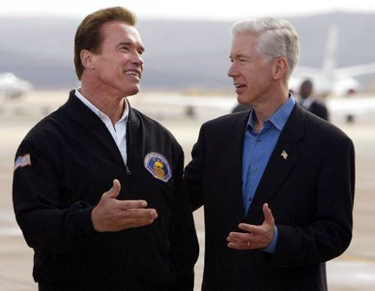
Brian entertained fresh hope.
But the former action star dashed his hopes by reversing the parole board’s recommendation for Brian’s release three years in a row. “He bowed down to the political pressure to be tough on crime,” he says.
“I had been serving the Lord for 14 years. The last time he reversed it really crushed me. It was the first time I questioned God. Up to that moment God told me he would do everything. I was confused. I had preached that God was a miracle working God. It felt like God was a thousand miles away. I had been married for many years. My wife and father were growing weary. I was broken. I didn’t know what God was going to do. I remember I walked around the yard and cried, went into the chapel and cried.”
A time to surrender
Then Brian arrived at a point of resignation and surrender. “I came to a place where I was really broken.”
“It doesn’t matter any more,” he told the Lord, “if I go home or stay in prison, I will serve you no matter what.”
At the same time, God was also working in his wife Laura’s heart. “She had a real estate company and was a pillar in the community. Everybody knew her in Paramount. She never told other people about me. She had a fear that the leaders of the community would turn their back on her. She was worried about perceptions that would hurt her company.”
“God broke her and she came to a place where she threw caution to the wind,” he says. She stunned many friends and business associates by opening up about her secret marriage to a former gang member serving a life term.
She stepped out in faith and got 600 letters of support from the community that were mailed to the governor, advocating for Brian’s parole.
As Brian waited to hear if the governor turned him down again, a prison staff member casually asked him , “Have you heard from the governor?”
“No,” Brian replied, certain the governor turned him down once more.
“Well, when you go home, make sure you do the right thing,” the staffer told him, cryptically.
Brian thought she misunderstood or was confused about his situation. He went to his bunk, opened the bible, and it fell open to Hebrews, chapter six:
“For God is not unjust to forget your work and labor of love which you have shown toward His name, in that you have ministered to the saints, and do minister. And we desire that each one of you show the same diligence to the full assurance of hope until the end, that you do not become sluggish, but imitate those who through faith and patience inherit the promises.” (Hebrews 6:10-12 NKJV)
A moment later, an African American gang member approached Brian and sat down on his bunk. It was very unusual for a gang member of a different ethnicity to approach in such a manner.
“Can you keep a secret?” the man asked. He worked for a prison staff member and overheard some important information.
“The governor approved your release and you’re going home on Monday,” he man confided.
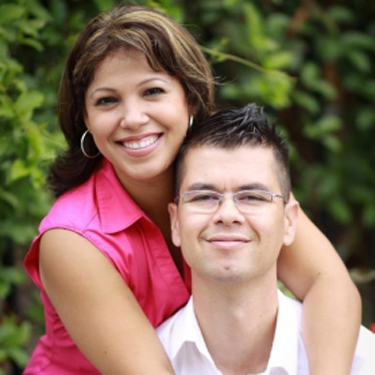
God was faithful to his promise! Brian was released from the darkness of prison in 2008 after serving 16 years, to his great joy and the happiness of his wife and family.
After his release, a family friend arranged a job for him with a freight forwarding business.
Months later, Brian joined the church staff of Dr. Larry Walkemeyer at Light and Life Christian Fellowship in Long Beach, attracted by the pastor’s vision for a multiethnic church and for church planting.
“My goal was to learn what a healthy large church was about, a multiethnic church. We were there for two years. We developed a launch team and in 2012 launched our church, Chapel of Change, with a desire to be a multiethnic church and a church planting church.”
Chapel of Change Christian Fellowship is a Free Methodist Church that currently meets on two campuses in
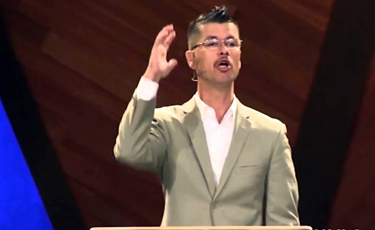
Long Beach and Paramount.
On their first Sunday, 700 showed up. “A thousand people have surrendered to the Lord since we started. Our mission is to give fresh hope to people in the city through the gospel of Jesus Christ.”
“My life was shattered by sin. I had no hope for a future. I was condemned to die a slow death in a dark prison.”
“I was like the woman who was caught in adultery: 110 percent guilty,” he says. “I knew my sin. I felt the sting of my sin. I knew I didn’t deserve another chance at life. But I learned that God is great in mercy (Ephesians 2:4), and His mercy is especially for the guilty (me). The more I embraced God’s mercy, the more my love for Him grew.
“He has done great things for me and is doing great things through my restored life. He took me in when the world kicked me out. He loved, protected and transformed me. He gave me a vision for my life. God’s love did for me what the world couldn’t do. It has been more than 20 years since I called out to the name of Jesus for help. My heart is still on fire for Him. Yours can be too.”
If you would like to know God personally, go here
For more information about Brian’s book and his ministry, go here



